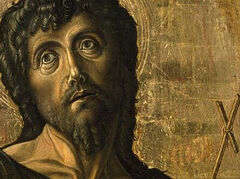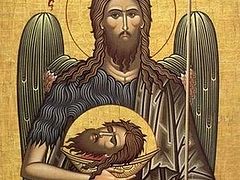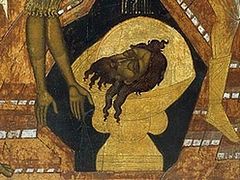The following is from a book of sermons by the famous Moscow archpriest, Fr. Dimitry Smirnov (†2020), published by the Sisterhood of Holy Nun-Martyr Grand Duchess Elizabeth (Moscow, 2001).
Today with the whole Church we remember the blessed end of the Forerunner of the Lord, John. Usually if the feast of a great saint coincides with a fast day, the fast is relaxed. But the feast of the Beheading of St. John the Baptist itself is a fast day, because our solemnities are mixed with sorrow. This is connected with the fact that after the Forerunner’s death, his soul went to hades (in Hebrew, sheol), like the souls of all people (beginning with Adam and Eve), and remained there until the Lord descended there and led out all the righteous.
John’s service consisted in being a prophet; that is, he told people of God’s will, which comes with repentance: Repent, for the Kingdom of Heaven is at hand. And he performed his service to the end; he was faithful to God to the death. Most of the prophets, and all but one apostle, were killed. Why does this usually happen to prophets? Because man has turned away from God and his will goes against God’s will, resisting it.
Just try telling someone the truth to his face. You’ll receive nothing but hatred from anyone, even from a church-goer, because truth hurts. When something hurts, we begin to hate that pain. That is natural. And therefore, when someone announces God’s will to a sinful person, he begins to hate the one who is announcing God’s will. Very few want to correct themselves, and that is why most prophets are hated. That is why they hated St. John the Baptist.
He was filled with the Holy Spirit, and in the light of God’s Spirit, human sins were revealed. And the Forerunner rebuked all who came to him, pointing out their sins. He even rebuked the king for marrying his brother’s wife. This was a terrible sin, the sin of incest. John said that Herod does not do well, and is setting a bad example to his subjects. After all, those in power have a great responsibility—how they behave themselves, what they do. If the king does such things, then what is there to be said of the common people? And truth hurts; Herod wanted to kill John, but he was afraid because the people revered him. That is why he had him imprisoned—out of sight is out of mind, as they say. “He’s sitting there and not bothering me”, he thought. “Now I can peacefully engage in drunken debauchery, and have fun in life. But his depraved wife’s daughter, at the devil’s instructions devised the plan that Herod in a drunken state would promise her anything she asked. And her mother said, “Ask for the head of John the Baptist”—because his very existence reminded her of her sin.
Just try reminding someone all the time of his sin—he will hate you. No one will say, “Yes, I really am a sinner; I’m even worse than you think, because I’ve also done this, that, and the other thing. No, they’ll all say: “What about you? Just look at yourself.” That is why St. John the Baptist was killed. This of course happened by God’s Providence—he suffered for Christ. He endured unto the shedding of blood, fulfilling his duty of service as a prophet.
And we have to think about this very hard. The thing is that a sense of duty is a quality inherent only to a spiritual person. In modern humanity, when the Spirit of God has left people’s hearts, this sense is being lost. But the image of St. John the Baptist reminds us of it. Did John know what would happen to him if he rebuked the king? Of course he knew. Then why did he not remain silent, but went to sure death? Because he could not do otherwise—his conscience, his duty told him that he must act in the name of truth, in the name of the God Whose prophet he was. And this is precisely why on the commemoration day of the Forerunner, a Pannikhida (memorial prayers) is served for all soldiers—because they also fulfilled their duty unto blood (well, not all of course). But just the same, the principle of the military oath is such that a man sacrifices his life in carrying out his service.
From today’s feast we can cull a very important teaching. Each of us is placed by God in some line of work: one is a cook, another is a teacher, a third is a policeman; and to a fourth, God gave children. Each has a certain obligation. And conscientious fulfillment of these obligations to the end, as before God, is very important. After all, every person on earth is here for a reason, and God needs him. Many came to earth as God’s co-strugglers. The Lord works in this world through people. He would like people to be true servants of God, so that they would fulfill God’s will. And each of us is placed in his own family, in a specific circle of people at work, visiting specific churches. Each has his own purpose, his own role, his own place in life— in the Church, in the universe, and in general in the building of the world. Not a physical but a spiritual place.
And we have to learn to fulfill our duty. But out of our spiritual weakness we continually slouch; the very elements of this world, its departure from God, lead to slouching. This is precisely why people in charge have such a hard time getting their workers to work conscientiously, and nothing helps: no matter how high the pay, they still slouch, can’t get things finished or do things conscientiously—there is always some defect. It’s because there is no foundation, no spiritual strength. A person does what was entrusted him by God (and every work is entrusted to him by God), poorly, and thus degrades his own soul. Any work that we might do, and especially work in the Church, has to be done to the end, service unto blood, with readiness to die for it. But we continually feel sorry for ourselves and violate this law of duty. We continually sin by this before God, and that is why everything falls apart in our lives.
We have difficult relationships with our relatives, very difficult relations at work because we have no self-sacrifice. We feel so sorry for ourselves that it prevents us from raising our children properly. After all, it is hard to explain things to a child, to try to briefly tell him everything, take time with him, and think of ways to set things up so that he’ll understand. It’s easier to tell him to go away, to tug his arm, or yell at him. It’s easier to just cut him off; and it’s much harder to approach the problem more patiently and attentively. And it’s not only that way with child raising—we continually sin in everything this way. Our life is very distracted—we grasp at one thing or another, and don’t do anything fundamentally or finish it. That is why everything falls apart for us; people aren’t occupied with their own work.
Why, for example, do men today turn into women and women into men? Why do people lose their hypostatic essence? Precisely because it is much harder to do what God has assigned to us. It is easier to work than to raise children. That is why women go to work, and murder their children or take them to a nursery or child care center.
If a person fulfills his duty to the end, he would in this show his faithfulness to God. Some think: How can I set things up so that I would be saved? Read akathists, make prostrations, make trips to monasteries? Fulfill in good order what God has entrusted to you directly: lead your family, raise your children, and do the work you do so conscientiously so that God would rejoice in you—and that is all, you don’t need to invent things.
But it is hard to do what is ours consistently. It is hard to not get irritated with my daughter—so I’ll go on getting irritated. And in order to somehow soothe my conscience, I’ll go to a monastery and leave money for prayers. The act itself is not bad, but it would be a thousand times better if we just did what God has given us and not look for some other path. It’s not bad to go to a monastery of course, but it is even better to meekly and humbly endure all the circumstances that take place where the Lord has assigned us to be.
So it turns out that we flounder around in search of salvation, while salvation is right next to us—it’s scattered all over. The Lord Himself saves us. We live in such a remarkable era, when we don’t need to search for anything—God offers it all Himself. He gives us a specific and necessary collection of sorrows, sicknesses, and all kinds of difficulties—only we don’t need to fuss, but rather to live in this and remain faithful to God; to not lose our spirit of goodwill, not despond, but to humble ourselves and endure and praise God for everything in life. So that whoever comes to our home, to our work could say, oh, that’s a true Christian. He never sticks his nose in other people’s business, is never rude, his gaze is always meek, her face isn’t painted up, she’s always decently dressed, modest, industrious, with her house in order; it’s hard to make him lose composure, he has no enemies, and is never angry with anyone.
Nowadays in order to save our souls, we don’t need to be great ascetics, or have five-inch lumps on our foreheads from prostrations. We simply need to be normal human beings. God does not expect ascetic feats from us—just don’t whine, but do what God has given you where He’s put you. Don’t feel sorry for yourselves, but serve God unto blood where you are. Do not give yourself privileges, do not be cunning, and do not deceive.
And you don’t need to look for super-powerful prayers that basically don’t exist. You don’t need to look for clairvoyant elders or prophets. Just serve God, seek God Himself where you are. After all, this is possible anywhere a person may be. You don’t need to run ahead and look for something extra, but you do need to look around you.
Some think: O, there is grace here and not there. What do we mean by grace? We don’t even know what it smells like. St. Seraphim of Sarov gave us an example. He lived in his hermitage, and he had everything there: Jerusalem, and Golgotha, and the Jordan—he designated all this for himself and never went travelling. Elder Dositheus appointed him to go to Sarov Monastery, and there he stayed—and attained great grace. That is what we should do. But we are continually searching for something, because we don’t feel like doing what’s ours to do. We are always looking for something outside us, while salvation is right under our noses.
We know that sometimes when we help someone else put up their wallpaper, it’s much harder than doing it in our own apartments. Why, we might ask? It’s the same wallpaper. It’s because doing it for your own family is your duty, and a duty is always hard. But the demon of vainglory can help us do it somewhere else—you get praise, and treats, and there is no particular responsibility. That is why it can be easier.
The Lord said, “Love your neighbor”. And who is your neighbor? It’s the one who is near you at the given moment. Your wife is your neighbor, your husband is your neighbor, your daughter is your neighbor. Therefore, whoever wants to save his soul should first of all come home and look around. Maybe something needs to be done around the house, or your grandchild needs help, or your son, or your son-in-law. Our salvation is in our neighbor; it is all very close, and you don’t need to travel far and wide to find it. You don’t need to look for a beggar to give him alms or bring someone some money. That is again not bad in and of itself, and God accepts any good deed. But you don’t need to go far away to do this. But it sometimes happens that a wife takes someone apples while her own husband is neglected and hungry. Get it yourself, she says. Who are you—my boss? Absolutely crude, abnormal relations. Or one’s own children are totally unmannered, and the parents don’t know what to do with them. They are ready to do God knows what else but their main, God-given parental work.
And so we’re ready to go here or there to pray or read akathists, but at home—we start to yawn and say, oh well, I’ll rest a little, I’m kind of tired today. We’re too lazy to read the Gospel because no one is watching us, and the demon of vainglory doesn’t help us. There you are—you and God. Do it! But this doesn’t happen with us.
And the image of St. John the Forerunner reminds us that we should fulfill our life’s duty unto blood. And if we iron someone’s shirt or do their laundry, or fix them dinner—that is our sacred obligation before God. And in raising children, washing dishes, wiping the windows, we serve God—because we deny ourselves and serve our neighbor, we bring joy to our neighbor, show him love. And there is nothing higher than this love.
And we need to do this, of course, to the glory of God, because we can lurch to the opposite side: Everything is sparkling and shining, but there is no time to pray—don’t you see that she’s scrubbing the pot. That is also not how it should be. But every pot, plate, shirt, and sock—all simple tasks should be done to the glory of God. So that the Lord would see that we wash, sew, iron, and stand in line at the grocery store for His sake. So that He would rejoice in our industriousness, in our obedience, our patience. So that he would see that no matter in what conditions He places us, we always remain faithful, and have learned meekness and humility from Him.
And when we acquire this, we acquire peace for our souls, because we acquire God. We stand on the rock, and our house, the house of our salvation, will stand firm. But if we weaken, then we can always call out in prayer to St. John the Forerunner. We don’t want to wash the dishes? Pray, “St. John the Forerunner, you fulfilled your duty as a prophet unto blood, unto death, while I’m not in any danger here. And although I don’t feel like doing this, I have to, so help me.” Or one of our relatives demands our attention but we’re tired and want to rest. It’s easiest of all to say, “listen, leave me alone.” This is very easy and habitual; we very habitually act rudely toward our closest family members. After all, they won’t take offense, they’ll forgive us. It is much harder to turn to someone. And when we haven’t the strength for it, we can again call out in prayer to St. John the Forerunner. He knew that he is a prophet, that he should be the voice of one crying out in the wilderness, that he should prepare the way for the Savior, loosen the soil on which the seed—the word of God—will fall. And he knew that his only award for this would be death, but he nevertheless fulfilled his service to the end.
So we too should know that if we honestly, nobly, and punctually fulfill our duty to the last detail, we won’t receive any awards and no one will praise us. When we do something at home for our families, everyone will see it as our obligation. And what we do not for glory, not to hear, “thank you”, but just because, is precisely what is of value. This is what God accepts; because we do it not for praise, not because we “want to”, but just to fulfill our duty, to please God. This is how important that is. And we can serve God in these such simple, ordinary things. May the Holy Prophet, Forerunner, and Baptist of the Lord himself help us in this. May the Lord save you!




